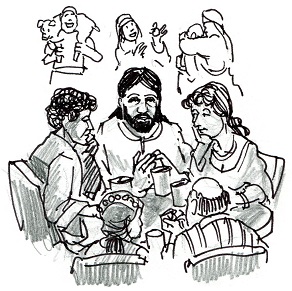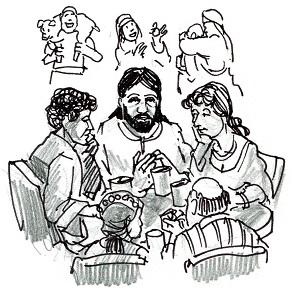

“I know those whom I have chosen” (John 13:18).
Acts 13:13-25; John 13:16-20
How are we to proclaim, much less understand, someone whose life met with constant misunderstanding and rejection? A village carpenter with no formal religious training appears in the backwaters of the Roman Empire, is rejected by his own leaders, arrested for subversion, betrayed and abandoned by his own followers and crucified by the Empire.
The burden of the first preachers, fueled by the incredible claim that he had risen from the dead, was to demonstrate that the life, death and resurrection of Jesus of Nazareth was in fact in perfect continuity with the grand sweep of salvation history and the fulfillment of the Law and the Prophets.
Paul’s speech in the synagogue at Antioch in Pisidia was to show that Jesus was the culmination of the Covenant between God and Israel from the time of the Exodus to the reign of King David, foretold by the prophets and proclaimed by John the Baptist as messiah. Jesus revealed God’s hidden plan to save the world not by power but in humility and contradiction, a suffering servant who conquered sin and defeated death on the cross.
John’s Gospel takes up this same paradox by showing that Jesus humbled himself by washing the feet of his disciples and laying down his life for them even when they betrayed and abandoned him. More than a messiah, Jesus is the divine Son, the eternal I AM.
God’s continuity is apparently different than ours. God’s narrative for us gathers up both success and failure, light and darkness, consolation and desolation. Jesus’ own disciples exhibited the full range of human weakness, their limitations and even their sinfulness were deemed essential to their preparation to preach the Gospel of mercy and forgiveness. Jesus knew them when he chose them, just as he knows us and still invites us to follow him just the way we are.
When the church pursues the canonization of Dorothy Day, investigators will find in her life the full paradox Jesus lived and embraced in his disciples. Day often said that success was not the goal but only being faithful. She brought the wounds of her own early life to her conversion, then welcomed the broken refuse of society into the Worker houses, a chaos of damaged humanity as the crucible for her own spiritual journey to God’s mercy. How different this is than any program of self-improvement or accumulated virtue we imagine in the saints. How much easier it is to climb a mountain than to be caught up in the fire of God’s terrifying love. Jesus knows those whom he chooses, and the Good News is that his preferential love seems to favor sinners like us.
Advertisement






